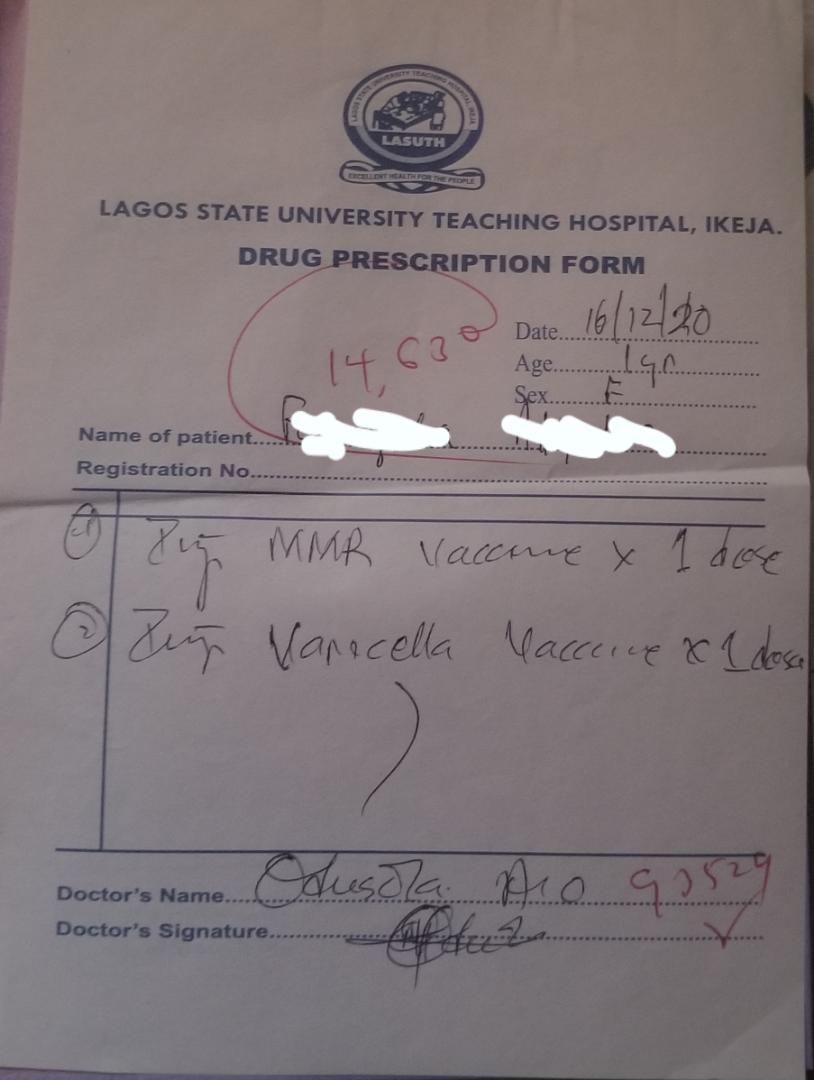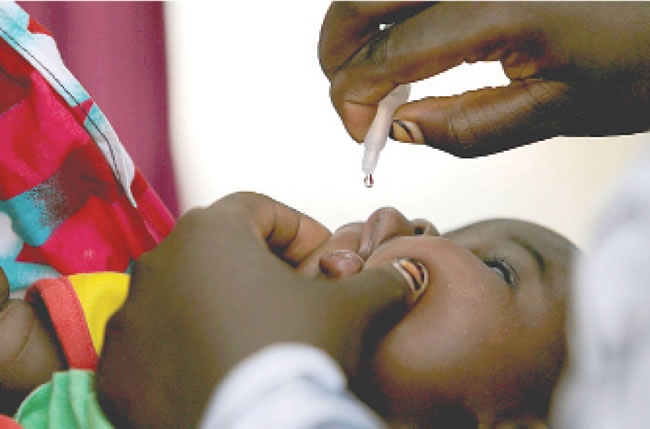ADETOLA BADEMOSI, in this concluding segment of a two-part report, writes on how children miss out on important vaccines and irregularities between public and private hospitals routine immunisation schedules.
Vaccines racketeering thrive in some government hospitals visited
In the course of this investigation, Nigerian Tribune discovered nurses also engage in sharp practices through vaccine racketeering for interested parents.
Once they sense mothers’ willingness and readiness to get the vaccine, they offer to provide the shots at a cost believed to be lesser than what is obtainable in private hospitals.
Sadly, the trend has continued to thrive because parents are able to strike a bargain with the Nurse, while the Nurse on his or her part also makes fast money.
For instance, findings in the FCT revealed that a dosage of chickenpox vaccine in a private hospital costs N22,000 or more, depending on the healthcare provider, while same can be gotten from between N16,000 to N18,000 in a public hospital.
A child between ages 12-15months is then required to take the first and second doses at different intervals, making a total of N36,000.
At a popular private hospital within the Central Business District (CBD), close to Church Gate, the cost of getting the Hepatitis A vaccine is N16,500.
A parent, Mrs. Gloria Ndubuisi in an interaction with this reporter, explained how she was able to get the Chickenpox and Pneumococcal IV vaccine at the sum of N22,000 altogether with the help of a nurse at a popular Government hospital in Abuja.
To further authenticate the racketeering claim, this reporter visited the Federal Staff Hospital, Abuja with a two-year-old child to enquire on the cost of getting a child immunized against Hepatitis A.
The dark, slim nurse on duty, who runs an account with Access bank account number 0041***183 tactically ushered this reporter to a quiet corridor and said, “we don’t give but if you need it, I can get it for you. It is N8,000 for a dose. The second dose will be after four weeks.”
However, the efficacy or safety of these vaccines cannot be vouched for as inappropriate storage could affect its potency.
The WHO 2015 report on vaccine storage titled:” The vaccine cold chain”, describe vaccines as sensitive biological products. It said while some vaccines are sensitive to freezing, some are subtle to heat and others to light.
According to the report, vaccine potency, meaning its ability to adequately protect the vaccinated patient, can diminish when it is exposed to inappropriate temperatures.
“Once lost, vaccine potency cannot be regained,” the report stated.
“To maintain quality, vaccines must be protected from extreme temperatures. Vaccine quality is maintained using a cold chain that meets specific temperature requirements.”
While confirming the findings by Nigerian Tribune, the National Primary Health Care Development Agency (NPHCDA) said it had commenced discreet investigation in partnership with the Department of State Services (DSS) to arrest perpetrators in Abuja.
It particularly mentioned such acts were mostly rampant at the Jabi Medical Centre, Abuja.
But the case was completely different at the Lagos State University Teaching Hospital (LASUTH).
The immunisation nurses on seat had instead directed this reporter to get a vaccine prescription from the staff clinic before proceeding to the pharmacy to make payment.
After the process was completed, the total cost for a dose of both the MMR and Chickenpox vaccine alternatively known as varicella, was put at N14,630.

Rota., Chickenpox, MMR, PCV IV, how important?
According to the WHO, Rotaviruses are the most common cause of severe diarrhoea disease in young children throughout the world.
As a result, it recommends that rotavirus vaccines should be included in all national immunization programmes and considered a priority particularly in countries in South and Southeast Asia and sub-Saharan Africa.
While corroborating this, the Centre for Disease Control and Prevention (CDC) says the virus which can easily spread among children, could cause severe watery diarrhoea, vomiting, fever, and abdominal pain.
Also, UNICEF describes diarrhoea as the leading killer of children, accounting for approximately 8 per cent of all deaths among under-five globally, as of 2017.
Apart from exclusive breastfeeding, UNICEF among several other preventive measures, recommended the rotavirus vaccine saying it, “provides protection against one of the most common causes of childhood diarrhoea-related death.”
Chickenpox on the other hand, is described by UNICEF as, “single virus that can linger for a lifetime.”
According to WHO 2015 report titled: Immunization, Vaccines and Biologicals, the varicella virus alternatively Chickenpox is regarded as highly transmissible via respiratory droplets or direct contact with characteristic skin lesions of the infected person.
It says when infected, the virus remains latent in nerve cells and may be reactivated causing a secondary infection called herpes zoster, in adults.
The report adds that the Varicella vaccines are available either as a single antigen and in combination with measles, mumps and rubella vaccine (MMR).
While Measles is described by the WHO as a highly contagious disease caused by a virus that mostly results in high fever and rash, Rubella is an acute, contagious viral infection that usually causes a mild fever and rash in children and adults.
Although, Nigeria for instance has introduced the Measles II vaccine dose in the national schedule, the WHO recommends that countries take the opportunity of accelerated measles control and elimination activities to introduce rubella-containing vaccines.
FG, stakeholders react
When contacted Dr Bassey Okposen, Director, Disease Control and Immunisation, National Primary Health Care Development Agency (NPHCDA) in a 26 minutes interaction with this Reporter, affirmed this reporter’s findings on government skipping the Rota Vaccine despite its inclusion in the schedule.

He said the vaccine which is included in the national schedule was not approved because the GSK brand being sought for was not available globally.
But, Okposen disclosed that its roll-out would commence in the third quarter of 2021 as the agency already got its approval.
“We have currently gotten approval from GAVI. It is the timeline of delivery which we are looking at the third quarter.
“For us, we are bent on getting the RotaSiil because it is the best in the world. That is the brand from GSK but the story is that it is not available globally and for Nigeria it will not be enough.”
Okposen further stressed that the MMR vaccine has not been approved by the FG saying: “you cannot introduce MMR in a country if you don’t have a routine immunization of 80 percent and above. It’s the standard anywhere.”
He argued that introducing mumps to the measles shot may prime children for CRS or down syndrome.
“We have severally said this, there is no need to introduce mumps vaccine in Nigeria like the MMR but if you go to private clinics you will see it and a lot of such children will still come down with CRS,” he stated.
Like others, he asserted that for private hospitals who give such vaccines, they are merely “out for business”.
For other vaccines listed in the report, the Director noted that the government cannot continue to fund vaccines for diseases or virus considered eradicated.
From his explanations, he said before vaccines are introduced, the significance of such disease on public health is considered.
“…If you look at the chickenpox for instance, where did you see a typical case of such? So why would we give the vaccine? We will just be wasting money,” says Okposen.
On the likelihood of disease resurgence, he explained that: “In public health, once the herd immunity is building, the disease disappears on its own and that is what we are trying to do in COVID-19. Once we have herd immunity of 70 to 80 per cent on its own, it will move to where the herd immunity is low. It is natural.”
On the contrary, a Virologist and Medical Laboratory Scientist, Dr Solomon Chollom argued that every disease prevention vaccine should be administered at their various scheduled times.
He reminded that Nigeria because it lacks vaccine producing institutions, resorts to importing these vaccines which cost the nation a fortune.
As a result, Dr Chollom said: “in an attempt to cut costs, they look at the epidemic map in Nigeria to see which diseases are much more prevalent and likely. So they seem to streamline.”
He, however, said irrespective of the circumstances surrounding this, every vaccine preventable disease that already has a vaccine developed for it, should be captured in the schedule.
The Virologist further faulted claims that the MMR vaccine could prime children to CRS or down syndrome, saying: “…but there have not been such clear cut instances that had to do with safety.
“You need to understand that when people want to do the wrong things, they will always get reasons that are intelligent, they put up intelligent reasons to defend their positions but scientifically there is no evidence backing that claim.”
In his reaction, Dr Chris Akude, a Family Physician with a leading private hospital in Abuja, countered claims that such vaccines were listed to swindle parents.
He said public hospitals do not list them in their schedule as they are paid for.
“It is not entirely true. You know sometimes, when you don’t have an answer to a question you just label everyone as bad. It is not swindling. Those ones, you actually pay for them, secondly, those who can afford it gets it and those who can’t don’t get.
“So what it means is that their children will be exposed to it. If you go abroad, all those things are covered. It is not covered. It is like here if you want to do CT scan it is N60,000 how many people can afford that? But it is there in private hospitals does that now mean we are swindling them? It only means that we can provide the service to those who can afford them.”
‘This report is done with support of Wits Journalism and the African Investigative Journalism Conference.’
YOU SHOULD NOT MISS THESE HEADLINES FROM NIGERIAN TRIBUNE
We Have Not Had Water Supply In Months ― Abeokuta Residents
In spite of the huge investment in the water sector by the government and international organisations, water scarcity has grown to become a perennial nightmare for residents of Abeokuta, the Ogun State capital. This report x-rays the lives and experiences of residents in getting clean, potable and affordable water amidst the surge of COVID-19 cases in the state…
Selfies, video calls and Chinese documentaries: The things you’ll meet onboard Lagos-Ibadan train
The Lagos-Ibadan railway was inaugurated recently for a full paid operation by the Nigerian Railway Corporation after about a year of free test-run. Our reporter joined the train to and fro Lagos from Ibadan and tells his experience in this report… Three dies, five injured as INEC loses staff to motor accident ; Three dies, five injured as INEC loses staff to motor accident ; Three dies, five injured as INEC loses staff to motor accident.







